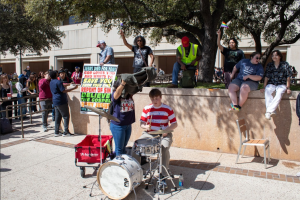Admin gives classroom renovation updates at SGA assembly
March 28, 2023
University administrators presented updates about the evaluation of UTSA facilities and classroom renovations at the university’s five campuses.
Presenters included Vice Provost for Academic Innovation Melissa Vito, the Academic Innovation team and Liz Rockstroh from the office of the vice president for business.
Rockstroh began by talking about the maintenance of campus buildings and explained that the university’s Real Estate, Construction and Planning team is working closely with facilities to “assess the facilities on campus.”
Buildings will be assessed based on the Facilities Condition Index, which will be used to prioritize any areas that might need attention. The Index will be used to assess UTSA’s five campuses, beginning with older buildings. Components that will be looked at include the exterior and the roof and plumbing. The first report of this assessment is expected to be ready by summer. Once all reports are received, a project list will be created.
Rockstroh further touched on classroom upgrades, which are an ongoing collaborative effort with other university areas, including Academic Innovation. According to Rockstroh, 67 classrooms — which is over 40% of those at the university — have been renovated over the last two years. The total cost for the project was $31,731,568. Upgraded classrooms on the Main Campus spanned several buildings, including the MH, MS, NPB, BB, FLN, EB, AET, SEB and the ART building.
Vito explained the collaborative effort that went into this focus on classroom renovations. One of the common points of feedback the team received was the ability to use different modalities for learning. Another point made was moveable furniture. Vito also addressed the goal of making the campus more accessible for students. Finally, the faculty expressed the desire to have predictability regarding equipment and its use.
The team tried their best to incorporate these points of feedback, despite limitations such as a lack of moveable furniture in core classrooms. On the other hand, where possible, the team was able to upgrade classrooms to make them “state-of-the-art” with high-level technology.
“What we were able to do during this time was build not just the physical environment, but think about what training our faculty were going to need to be able to succeed in these classrooms,” Vito said.
Marcela Ramirez from the Academic Innovation team concluded the presentation by discussing the aforementioned training. This training is facilitated through RowdyFlex, which Ramirez described as a “guide for faculty to start incorporating new teaching strategies using the technology in [these new classrooms].” In addition, the team is also working on developing more hands-on training experience.
Ramirez also gave updates on the university’s switch to Canvas, which is set to take place in the fall. A working group with faculty and staff from different departments and student representatives exists for discussion about the migration.
According to Ramirez, the aim is to give students access to the new platform in May. There will also be help hours and self-paced online training. Student representatives are also participating in brainstorming the resources and training needed.
After the presentation concluded, the floor was open for feedback and questions. During this time, Rockstroh and Vito addressed the importance of accessibility when it comes to renovating classrooms.
Following a recess, the assembly then moved on to its biweekly updates, given by executive team members and committee chairs.
SGA President Jasmin Paquet-Durand Ford started by reiterating information about SGA’s upcoming election, which is scheduled to occur from 8 a.m. on Monday, March 27 to 11:59 p.m on Tuesday, March 28. For past elections, SGA would offer students that voted a slice of pizza; however, the organization will be doing away with this practice, which Paquet-Durand Ford described as an ineffective use of SGA funds.
She also discussed updates from the Student Union Advisory Council, including the construction of bathrooms in the Student Union and plans to renovate the Denman Ballroom in fall 2023.
Finally, Paquet-Durand Ford updated the assembly on SR 47-02 regarding Student Union fees, which was passed last semester. The resolution “calls on SGA to work with the Student Union and related parties toward the reconsideration of the collection of fees on Registered Student Organizations for borrowing and using Student Union equipment.”
Currently, student organizations do not pay for things like meeting room reservations since students already pay a Student Union fee. They pay a fee only if they require services with “extraordinary efforts,” like a wheeled-out spotlight that is manned throughout an event.
Furthermore, the Student Union does not have a flat fee structure but rather a more complicated alternative based on semester credit hours, unlike any other public institution in the state. While they are not in a budget deficit, the Student Union is evaluating the implementation of a flat fee structure due to a decrease in credit hour numbers despite an increase in enrollment numbers. The incorporation of student organizations and their needs into this conversation of a flat fee structure is also being considered.
Paquet-Durand Ford pointed out that this change in fee structure would not take place this year or next year.
Paquet-Durand ended by highlighting the PEACE Center, which “provides support services and prevention education to those who have been impacted by sexual violence.”
Finally, Treasurer Marc-Anthony Medina reported that the balance for the SGA budget still stands at $22,857.61.
Following updates, the assembly moved on to the consideration of amendments to the SGA By-Laws. This time, an amendment to the by-law concerning committee assignments was proposed. Under the amendment, committee members that are re-elected to serve in SGA will automatically be nominated to serve on their respective committees to ensure continuity. All nominees must still be approved by the General Assembly to serve on the committee. The amendment passed by unanimous consent.
The assembly ended with deliberation and a vote on legislation introduced by Senator Joseph Nieto. The resolution — SR 47-03 — proposed that stipend-eligible members of SGA be required to complete certain leadership training as a part of their responsibilities. Currently, there are no requirements like this for stipend-eligible members other than the responsibilities outlined in the SGA constitution.
There was considerable discussion about the specifics of these trainings and whether they should be required for all SGA members, not just stipend-eligible members. Eventually, the amendment passed 18-3.
SGA’s final Joint General Assembly of the semester will take place on Thursday, April 20.









